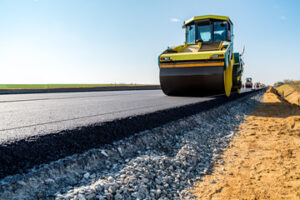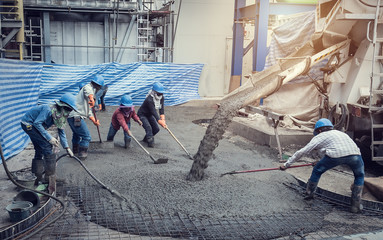Asphalt is a mixture of aggregate materials (like crushed rock, sand, and gravel) bonded by a sticky black, petroleum-based material called bitumen. It is used to construct and maintain roads, parking lots, driveways, etc.

From when it leaves the plant until it is laid asphalt must be kept at a high temperature. This allows it to be rolled and compacted effectively. Keep reading the article below to learn more about Asphalt Paving Fort Lauderdale.
Asphalt is commonly used in the States to pave roads, parking lots, and driveways. Millions of workers use it daily to build and repair our nation’s infrastructure. However, working with piping hot asphalt presents specific hazards and requires significant safety precautions.
One of the most important things a worker can do is to follow established safe work procedures at all times. This includes checking equipment before starting a shift, ensuring that all safety mechanisms are functioning properly, and reporting any unsafe conditions or situations immediately.
Another important step is to make sure that workers have access to proper personal protective equipment (PPE) to help minimize exposure to physical, environmental, and chemical hazards. This includes wearing appropriate gloves, eye protection, and clothing that is durable and breathable. It is also critical to ensure that all workers are familiar with the equipment they will be using, their crew’s specific routine, and the hazards associated with their job.
PPE should be properly fitted and maintained, and workers should be trained in the proper use of these items before they are allowed to operate machinery or handle a particular type of materials. This training should include a thorough review of the manufacturer’s instructions for each piece of equipment. Workers should also know where to find emergency safety devices like fire extinguishers and eyewash stations.
Asphalt is stored and handled at extremely high temperatures, and it can burn the skin if it comes into contact with it. It can also irritate the eyes with its fumes and asphalt particulate. It’s important for workers to wear gloves and long sleeves when working with asphalt, and they should wash their hands well before eating or drinking anything.
Traffic management is a critical part of any construction project, and asphalt paving is no exception. Clearly marking road maintenance zones and implementing temporary traffic restrictions is essential for ensuring the safety of both drivers and workers. Drivers should be required to slow down and move over when passing construction vehicles, and flaggers should be stationed to warn drivers of upcoming changes in road conditions. If possible, asphalt paving projects should be performed at night to limit the impact of lane closures on traffic.
Durability
Asphalt is a durable material that holds up well to heavy vehicle loads. It is a versatile construction material that can be used in a variety of applications, including roads and parking lots. The durability of asphalt can be increased by using multiple layers in the paving process and laying and compacting them quickly. This will help prevent the formation of ruts and extend the lifespan of the pavement. Another way to increase the durability of asphalt is by applying a sealcoat after it has been laid and compacted. This will protect the asphalt from harsh weather conditions and extend its life.
The longevity of asphalt is determined by a variety of factors, such as traffic volume, geology, climate, and construction. Asphalt paving can last up to 30 years or more, depending on the maintenance and care that it receives. Regular inspections, timely repairs, and quality asphalt paving will greatly improve its longevity.
In addition to proper maintenance, a number of other steps can be taken to make asphalt more durable, such as adding chemical admixtures to the mix or increasing the density. Many states have adopted specifications that require contractors to use higher-density mixes. These specifications often include incentive/disincentive pay factors to encourage contractors to meet the requirements and achieve the highest possible densities.
Another method to increase the durability of asphalt is by laying and compacting it in thinner, multiple layers. This will help to reduce the amount of water that seeps into the ground, which can damage and weaken the pavement. This method also helps to ensure that the layer is compacted properly and evenly, which will also help to extend its lifespan.
A final way to improve the durability of asphalt is by using a preservation agent. This is a nontoxic material that can double or triple the lifespan of the road and will not cause any harm to the environment. It can also be applied at night, which will save time and money.
In order to get the most out of your asphalt, you should choose a high-quality contractor. They will have the proper equipment and training to complete the job correctly. They will also use the best quality materials and follow strict environmental protocols. In addition, they will use a line painting and striping system that is designed for asphalt pavement. This will create a beautiful and professional look for your pavement.
Easy Maintenance
Asphalt is relatively easy to maintain when compared to other paving materials. Regular maintenance includes pavement sealing, patching and crack repair. A sealcoat protects the surface from water, oil and UV rays. It also helps to reduce fading and improve appearance. In addition, proper drainage is important to avoid water damage. Regular sweeping removes loose debris that can cause damage.
Performing regular visual inspections of your paved surfaces will help you identify problems early on and prevent them from getting worse. Pay special attention to any areas with cracks or potholes – these should be repaired as soon as possible. If left unattended, these cracks will widen and the underlying base can be exposed to traffic and climate conditions that lead to further deterioration.
A professional paving contractor will be able to provide you with an estimate for any repairs needed. It’s normally much cheaper to do some minor repairs now than it is to wait and end up with a major problem at the worst time.
In some cases, a full-depth reclamation (FDR) procedure may be required to restore badly damaged areas of the pavement. This is a process that involves replacing the old surface by mixing in new material and using a roller to compact and smooth it. It’s a good option for roads that are heavily used and need to be resurfaced.
Ultimately, all paved surfaces will eventually reach the end of their life. Even well-maintained asphalt will deteriorate, and the condition will become less desirable with age. This is the reason why it’s so important to plan for some major repairs at least every 10 years.
Asphalt paving is a popular surfacing material for sports courts, such as tennis and basketball courts. It’s also commonly used for parking lots and roadways because it’s durable, cost effective and environmentally friendly. If you’re looking for a paving solution that is eco-friendly, sturdy and aesthetically pleasing, contact TRUEGRID today. We’ll be happy to answer any questions you have.
Environmentally Friendly
Asphalt is a much more environmentally friendly paving material than concrete. It requires less energy to produce and produces fewer greenhouse gases than other paving materials. It also has a longer lifespan and needs to be repaved less often than other types of pavements. Asphalt is easily recycled, which also helps reduce its environmental impact.
Because it is so flexible, asphalt is able to adapt to changes in temperature. This means that it is able to accommodate the heat of summer and the cold of winter. This flexibility also helps asphalt withstand weather conditions without losing its structural integrity. This makes it a safe option for paving roads and driveways in all seasons of the year.
The dark color of asphalt reflects the sun’s rays instead of absorbing it, which helps keep the area cooler. This is especially important in warmer cities and states. In addition, asphalt can help protect the environment because it is able to absorb and retain oil-based liquids that a faulty vehicle might discharge. This helps prevent these chemicals from washing away into water systems where they can harm animals and plants.
Unlike concrete, asphalt is easy to recycle and reuse. Almost 100 million tons of recycled asphalt is used each year, saving taxpayers a significant amount of money and reducing the need for fresh materials. This type of paving is a good choice for the environment because it can be made from various waste products, including old tires and shingles.
Porous asphalt can be used to reduce water runoff and flood risks in areas where there are heavy traffic or industrial activity. This type of asphalt allows rainwater to pass through into a gravel base where it is filtered and returned back to the environment. It can also be used to reduce the risk of aquaplaning and improve visibility for drivers on wet roads.
Because asphalt paving is so quick and easy to perform, it is a great choice for city road construction projects. Unlike other paving materials, asphalt can be laid in small windows of time during off-peak hours, which minimizes the disruption to travelers and businesses.



